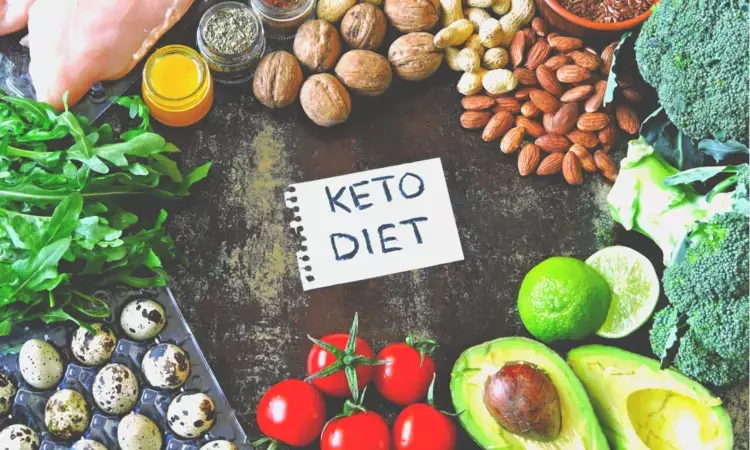- Home
- Medical news & Guidelines
- Anesthesiology
- Cardiology and CTVS
- Critical Care
- Dentistry
- Dermatology
- Diabetes and Endocrinology
- ENT
- Gastroenterology
- Medicine
- Nephrology
- Neurology
- Obstretics-Gynaecology
- Oncology
- Ophthalmology
- Orthopaedics
- Pediatrics-Neonatology
- Psychiatry
- Pulmonology
- Radiology
- Surgery
- Urology
- Laboratory Medicine
- Diet
- Nursing
- Paramedical
- Physiotherapy
- Health news
- Fact Check
- Bone Health Fact Check
- Brain Health Fact Check
- Cancer Related Fact Check
- Child Care Fact Check
- Dental and oral health fact check
- Diabetes and metabolic health fact check
- Diet and Nutrition Fact Check
- Eye and ENT Care Fact Check
- Fitness fact check
- Gut health fact check
- Heart health fact check
- Kidney health fact check
- Medical education fact check
- Men's health fact check
- Respiratory fact check
- Skin and hair care fact check
- Vaccine and Immunization fact check
- Women's health fact check
- AYUSH
- State News
- Andaman and Nicobar Islands
- Andhra Pradesh
- Arunachal Pradesh
- Assam
- Bihar
- Chandigarh
- Chattisgarh
- Dadra and Nagar Haveli
- Daman and Diu
- Delhi
- Goa
- Gujarat
- Haryana
- Himachal Pradesh
- Jammu & Kashmir
- Jharkhand
- Karnataka
- Kerala
- Ladakh
- Lakshadweep
- Madhya Pradesh
- Maharashtra
- Manipur
- Meghalaya
- Mizoram
- Nagaland
- Odisha
- Puducherry
- Punjab
- Rajasthan
- Sikkim
- Tamil Nadu
- Telangana
- Tripura
- Uttar Pradesh
- Uttrakhand
- West Bengal
- Medical Education
- Industry
Low-carb ketogenic diets lower CVD risk in obese or overweight people with type 2 diabetes

China: Low-carbohydrate ketogenic diets are more effective than non-ketogenic diets in improving cardiovascular risk factors (weight, blood glucose, and lipids) in overweight/obese patients, particularly those with type 2 diabetes, according to findings from a large, comprehensive and RCTs meta-analysis.
The researchers, in their study, published in Frontiers in Nutrition, felt the need for further prospective studies to determine the long-term effects of low-carb ketogenic diets on CV risk markers in overweight/obese people and to determine their influence on cardiovascular events endpoints in these populations.
Obesity is one of the most severe health issues worldwide. In both developed and developing nations, there is a continuous growth of obesity levels, with ∼38 and 20% of the world’s adult population predicted to be obese and overweight by 2030, respectively. Recent studies have suggested that obesity is a significant potential risk factor for chronic diseases, such as diabetes, cardiovascular disease, metabolic syndrome, cerebrovascular disease, and cancer, thereby increasing economic, medical and social burdens. Studies have also shown that normal weight reduces the prevalence of metabolic syndrome and all-cause and cardiovascular mortality compared to obese or overweight individuals.
The benefits of weight loss are related to cardiovascular risk factors (high-density lipoprotein (HDL), low-density lipoprotein (LDL), total cholesterol (TC), uric acid (UA), and blood pressure) besides blood sugar control. Dietary therapy is commonly recommended in clinical practice for weight loss.
Previous studies have proposed many different dietary approaches, including low-carbohydrate ketogenic diets, which include ∼15% carbohydrate intake, 25% protein intake, and 60% fat intake but without limiting calorie intake. Ketogenic diets with low carbohydrate content may mimic starvation in the body and generate ketosis.
Against the above background, Wei Luo from the Department of Endocrinology in People’s Hospital of Leshan, Leshan, Sichuan, China, and colleagues conducted a meta-analysis to explore the effects of low-carb ketogenic diets on CV risk factors in obese/overweight patients. However, there is not much literature data about the impact of low-carb ketogenic diets on CV risk factors in this population.
For this purpose, the researchers systematically searched the online databases that recruited obese or overweight patients on ketogenic diets to control cardiovascular risk factors. The overall effect size for continuous variables was presented as a weighted standardized mean difference (SMD). Subgroup analyses were performed when suitable considering type 2 diabetes mellitus (T2DM) status at baseline, based on T2DM comorbidity among patients. The meta-analysis included a total of 21 studies.
The authors reported the following findings:
- Low carbohydrate ketogenic diets exerted a more significant impact on CV risk factors in overweight/ obese patients with type 2 diabetes when compared with those on non-ketogenic diets, with lower fasting plasma glucose (FPG) (SMD, -0.75) and hemoglobin A1c (HbA1c) (SMD, -0.53) levels identified.
- Low-carbohydrate ketogenic diets significantly reduced weight (SMD, -6.72), body mass index (BMI) (SMD, -2.27), and waist circumference (SMD, -4.45) in obese/ overweight patients with T2DM.
- Ketogenic diets improved lipid profiles in these patients; triglyceride (TG) (SMD, -0.32) levels were lowered, and high-density lipoprotein (HDL) showed an upward trend with a P-value close to a statistically significant level (SMD, -0.32).
- Regardless of diabetic status at baseline, ketogenic diets were more effective in triglyceride reduction (SMD, -0.2) and increasing HDL (SMD, 0.11) levels than non-ketogenic diets.
To conclude, low-carbohydrate ketogenic diets effectively improved cardiovascular risk factors, i.e. weight, blood glucose, and lipids, in obese/ overweight patients, particularly those with T2DM versus non-ketogenic diets.
Reference:
Luo W, Zhang J, Xu D, Zhou Y, Qu Z, Yang Q and Lv Q (2022) Low carbohydrate ketogenic diets reduce cardiovascular risk factor levels in obese or overweight patients with T2DM: A meta-analysis of randomized controlled trials. Front. Nutr. 9:1092031. doi: 10.3389/fnut.2022.1092031
Dr Kamal Kant Kohli-MBBS, DTCD- a chest specialist with more than 30 years of practice and a flair for writing clinical articles, Dr Kamal Kant Kohli joined Medical Dialogues as a Chief Editor of Medical News. Besides writing articles, as an editor, he proofreads and verifies all the medical content published on Medical Dialogues including those coming from journals, studies,medical conferences,guidelines etc. Email: drkohli@medicaldialogues.in. Contact no. 011-43720751


